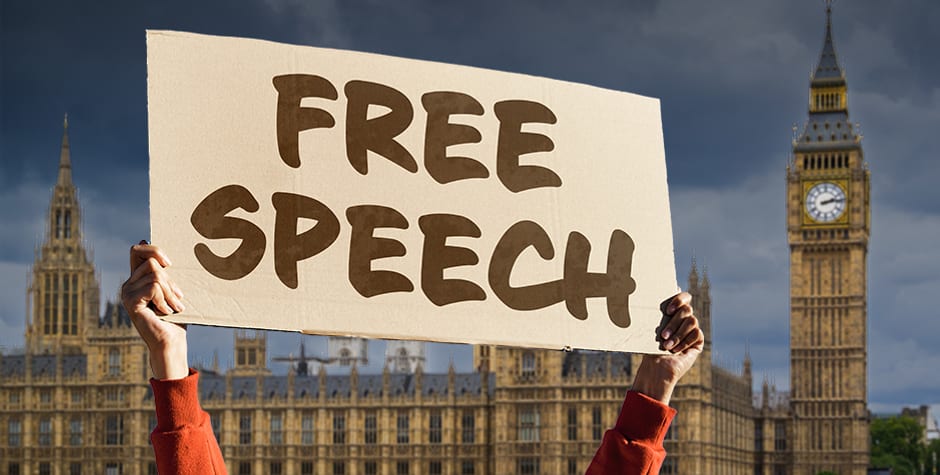Know the Risks: ACLJ Warns About Dangers of UK Speech Laws and Their Potential Impact on Conservative Americans
Listen tothis article
As an American, you have enjoyed the freedom to travel to any country without the threat of arrest for your posts on social media. Unfortunately, the concept of freedom of speech is non-existent in some countries – and the United Kingdom (UK) has specifically decided to target Americans. The ACLJ has a long history of fighting for the right to freedom of speech, and we want to warn you against these dangers with international travel.
The UK has declared that it will charge and prosecute Americans for their social media posts, written while still in America, if they travel to its borders. The ACLJ has prepared a legal memo detailing the specific laws at play and the danger for Americans. Specifically, it details how your speech on the internet could violate the UK’s broad “hate speech” laws and how you could be arrested as soon as you step foot in the UK for your posts back home.
If an American speaks in the United States in a way that UK officials construe as affecting their national interest or even producing substantial effects within the country, even if it’s just a statement about your Christian faith or your political stance, then you could be arrested upon entry to the UK.
UK officials have boasted how proud they are of this initiative: The UK’s Metropolitan Police Commissioner, Sir Mark Rowley, said in a press conference, “We will throw the full force of the law at people. . . . And whether you’re in this country committing crimes on the streets or committing crimes from further afield online, we will come after you.” British Prime Minister Keir Starmer has likewise warned, “I guarantee you will regret taking part in this disorder whether directly or those whipping up this action online.” The UK government has demanded that Apple allow it to access encrypted data stored by users worldwide in its cloud service, which would enable it to access information from and about Americans that has never been made public before.
Clearly, it is specifically conservative speech that is being targeted. The Police Commissioner has, in direct criticism of people like Elon Musk, said, “You can be guilty of offences of incitement, of stirring up racial hatred, there are numerous terrorist offences regarding the publishing of material.”
What exactly qualifies as a terrorist offense under the UK’s definition? Well, it’s at the whim of the police and officials, as the laws themselves are too vague to define specific violations. The Public Order Act of 1986 criminalizes “threatening, abusive or insulting words,” while the Communications Act of 2003 prohibits “grossly offensive” electronic messages. The Online Safety Act will further restrict what the UK deems “harmful” online content. Recent enforcement actions have included arrests of individuals for posting what authorities deemed “inaccurate” social media content, demonstrating the broad scope of these restrictions.
Americans should also know that European court precedents consistently uphold these types of speech restrictions. Multiple cases, as outlined in our legal memo, show courts prioritizing concepts like “social peace” and “non-discrimination” over free expression. They have upheld convictions for religious criticism, political speech, and other kinds of speech that would fall under the First Amendment, establishing a clear pattern of restricted speech rights compared to U.S. constitutional protections.
But beyond policing their own citizens, some leaders in the UK have toyed with the idea of extradition – bringing individuals from the U.S. to the UK for “criminal” online activity in violation of these hate speech laws. This is absurd. While Americans could raise First Amendment defenses against extradition attempts and the U.S. State Department maintains final discretion over extradition decisions, the mere threat of prosecution and even the attempt at extradition could create a chilling effect on protected speech.
Though UK law enforcement leaders have publicly declared their intent to throw the full force of the law at individuals posting content from overseas – it’s not all bad news.
Last week, Vice President JD Vance mirrored these concerns in his speech to the Munich Security Conference: “In Britain and across Europe, free speech, I fear, is in retreat.” He chastised European leaders for the very examples mentioned above, which are concerning canaries in the coal mine and eerily reminiscent of the totalitarianism witnessed during the Soviet occupation of Eastern Europe. “Unfortunately, when I look at Europe today, it’s sometimes not so clear what happened to some of the Cold War’s winners.”
Thankfully, echoing the Vice President’s concerns laid out in Germany, President Trump’s Administration is making plans to protect Americans from this threat. Mark Zuckerburg has announced that Meta will work specifically with President Trump to combat censorship in Europe. Recognizing that European countries are threatening our free speech rights, it is crucial that the U.S. be a voice for freedom around the world. We are grateful for a President who shows a commitment to U.S. citizens and our freedom of speech.
The ACLJ continues to monitor this situation closely and stands ready to defend those targeted for exercising their First Amendment freedoms. We remain committed to protecting Americans’ constitutional rights from foreign government overreach and ensuring that overseas censorship attempts do not compromise our fundamental liberties.
